- Home
- Michael Wallace
The Wicked (The Righteous)
The Wicked (The Righteous) Read online
The Wicked
by Michael Wallace
Author’s Note: The Wicked is Book #3 of The Righteous Series. Book #1, The Righteous, and Book #2, Mighty and Strong, should be read in order. There is also a Righteous novella, Trial by Fury, that may be enjoyed at any time after reading book #1. Also included: a bio from Michael Wallace, and an excerpt from Wallace's new World War II thriller, The Red Rooster.
Chapter One:
Allison Caliari watched the dumpster through a pair of binoculars. A young man crawled out, clutching half-eaten slices of pizza and a bag of moldy bread. He was a boy really, only nineteen or twenty and heart-breakingly thin, dressed in rags and wearing a scraggly beard. Somewhere, Allison imagined, the boy’s mother made desperate phone calls, hung fliers, begged the police to do something, anything, to find her son. Or maybe—and this was almost worse to imagine—his parents thought he was still in school, with no idea the boy was fighting rats for his breakfast.
Two young women emerged from the dumpster and crouched next to the boy. Allison caught her breath. She’d watched from the rooftop above the alley for two hours, since just before dawn, had seen the boy crawl inside twenty minutes earlier. But no girls. So where had they come from?
My god, did they sleep in there?
Before she could see the girls’ faces, hoodies came up and scraps of food garbage disappeared from the pile on the ground while the three ate. Why garbage? There was a soup kitchen at the Salvation Army, but they never visited it, and she never saw them at the Portland Rescue Mission, or anywhere else you could get a warm bed and a hot meal.
Mom, don’t you get it? Madeline had asked. I’m done, I don’t want you anymore. I don’t care about work, or school, or those stupid boys I used to hang out with. The sooner you get that through your head, the better.
“No,” Allison whispered. “I won’t. I won’t.”
Allison lowered the binoculars, took off her mittens and blew into her stiff, cold hands, and tried to figure out what to do next. The kids were growing wary and she didn’t want to spook them like after that crazy thing with the produce truck. She still couldn’t understand what they’d been doing. Iceberg lettuce? That wasn’t even real food.
Allison thought she had spotted her daughter in the lettuce-stealing group, but wasn’t sure. When she’d approached, they’d scattered into the night, leaving the back of the truck open, and heads of lettuce strewn across the street. The kids had abandoned their bivouac underneath the Hawthorne Bridge, and it took two weeks until she found them again, this time on the other side of the city. One more scare and they might leave Portland altogether.
She’d drive to Argentina if she thought she could get to her daughter, but she had to be realistic. What chance would she have if Madeline left Oregon? None, that’s what, so she’d wait here all day, if she had to, until she was sure it was her daughter down there. And then she’d block the alley, do whatever the hell it took. Allison lifted the binoculars back to her eyes.
The three of them had stopped eating and now sat with heads bowed. Each person placed a hand on the shoulder of the person to their right, until it completed the triangle. What were they doing down there, praying?
And then a hand fell on Allison’s shoulder as she was leaning over the edge, looking through the binoculars. The touch threw her off balance. She flailed and dropped the binoculars, which had been on a cord around her neck, but now slipped off and tumbled end-over-end. She started to fall.
The hand jerked her back. The binoculars hit the street with a pop and smashed to pieces. The three kids stumbled to their feet, faces upturned. The person spun Allison around. Heart pounding, she found herself face-to-face with a handsome young man with a beard, who fixed her with eyes so intense they reminded her of a tiger stalking its prey.
“Allison Caliari?”
She could barely get out a single word. “Yes.”
“You shouldn’t have come, you know that. We told you, we warned you. Your daughter told you.”
She found her voice, and with it, her anger. “I know. I have Madeline’s letter in my pocket and I read it every day.”
“Then why don’t you listen?”
“Why don’t I listen? She’s my daughter, I’m not going to walk away. If you think that, you don’t know anything about the way a mother thinks.”
“The others have learned, they aren’t looking anymore. Most of them give up as soon as they’re told they’re no longer needed or wanted.”
“Do you really believe that?” Allison asked. She fought a rising tide of fury and tried to shrug away the hand, but the man’s grip stayed tight on her shoulder, and there was enough fear left, standing so close to the edge of the building, with the memory of her near fall still trembling through her legs, that she didn’t dare struggle free. “You really think we’ve all just given up? We haven’t, we’ve found each other, and we talk. We track you and we email, we have support groups online, and we are watching for you and we’re not going to give up until we’ve got our children back.”
His eyes narrowed and she could see she’d made a mistake. Maybe he knew that people were looking for him and his band of brainwashed children, stolen from their dorms, their student apartments. Maybe he knew they wanted him behind bars, let him bunk with Charles Manson. Or dead, if necessary. He and David Koresh and Jim Jones and all the other evil self-proclaimed prophets could form their own cult in hell.
Or maybe he didn’t know. Maybe in his narrow focus, it had never occurred to him that parents would keep looking. But either way, it was stupid to point it out.
“They’re not children,” he said. “Or not your children anymore, at least. They’re grown-ups and they can make their own decisions. There’s nothing you can do.”
Her voice grew shrill. “There is something we can do!”
“You can walk away and forget it.”
“I know who you are, I know. And I’m not going to forget. Never!”
“Yes, you will. You’ll forget and you’ll stop looking. You’ll stop because a higher power will stop you.” His grip tightened on her shoulder, almost biting now, and it made her flinch. “You can either choose to stop willingly, or be destroyed.”
She caught her breath, tried to figure out what he meant, if it was just a threat. “Please, for god’s sake. I just want to talk to her. Can’t you let me talk to her, just for a few minutes?”
“No, you’ll never see her again, I promise you that.” He let go, turned, and made his way to the fire escape stairs on the opposite side of the building.
Allison stared for a long moment. Her heart still pounded. Once she caught her breath, she turned back to the alley. The dumpster sat open and empty. A nest of plastic garbage bags, some torn open, lay at the bottom, crumpled down into the shape of the two girls who had slept there last night. The stench lifted all the way to the roof. But the alley itself was empty.
“Allison Caliari.”
She turned, found that the man had stopped at the far side of the roof. “What do you want?”
“Next time I find you looking, I won’t pull you back from the edge,” he said, “I’ll push.”
Chapter Two:
Eliza Christianson didn’t recognize the two men as troublemakers, not at first. They weren’t drunk and they didn’t smell like pot. They weren’t being loud and they didn’t make rude comments to the woman at the ticket window. They didn’t come with girlfriends, planning to pair off in a quiet corner of the gardens, only to have some elderly couple complain at the office about “lewd behavior.” What the two men were, however, were polygamists.
They’d come to find Eliza.
She was tired and maybe that’s why she didn’t notice at f
irst. She was moonlighting as a waitress while working four days a week at Red Butte Gardens in the foothills above the University of Utah. Her bishop in the LDS ward was the director of the gardens and had given her the job after she explained how she was trying to earn enough over the spring and summer to attend class full time in the fall. Her brother Jacob was paying her tuition, but she needed living money.
Eliza was tired because twenty-eight people had come into the restaurant just before closing the previous night and camped out in the garden room. Some multi-level marketing thing. It was half meeting, half orders of pie or cornbread, with the occasional appetizer and lots of free drink refills. Seventy-two minutes past closing the manager finally asked them, politely, to leave. The group tipped a total of $27.92 in singles and change to be split between three waitresses. Technically, she supposed, it was fifteen percent of the total bill. It covered roughly two percent of the aggravation.
And so she was fighting a yawn when the two men came out of the gift shop, pulled on sunglasses and asked her for a map of the gardens. She handed them a map, gave a brief overview, then said, “The tulips are in bloom. The weather has been perfect and they’re especially beautiful this year. Go past the fountains and you’ll see them on the right.”
The taller man said, “Thank you, Eliza Christianson.”
She gave him a sharp look. “What? How—”
Before she could complete the thought, he was pointing to the name tag on her blouse. Utahns loved name tags and she wore one at the restaurant, at the gardens, even at ward socials. She glanced down at the name tag and had started to feel silly about her paranoia when he continued, “The Lord delights in a beautiful flower. It is beautiful in His sight.”
And before she could recover, the two men continued into the garden, while she gawked behind them. A prickling sensation worked itself along her spine, and although the sun was overhead in a clear sky and the breeze was warm and gentle, she felt a chill.
“Is there something wrong?” a voice asked behind her.
It was her bishop from the LDS student ward. He gave her a protective look, then followed her gaze. A frown crossed his face. It was the same expression he’d give to overzealous returned missionaries who tried to hit her up for a date between sacrament meeting and Sunday school. A time and a season for everything, elders, he’d tell them, a time and a season for everything.
Bishop Larsen waited until they were out of earshot. “Those men weren’t bothering you, were they?”
“No, I’m just trying to think if I’ve seen them before. I don’t think so.”
“Okay, but you’ve seemed out of sorts all morning. Is everything all right?”
“Late night at the restaurant and it was a tough crowd. I’m sorry, I’ll get my head in the day, I promise.”
“No worries,” he said. “It’s a slow morning. The students are at finals. No events scheduled. Half the people this morning just want to find a quiet corner to bury their heads in textbooks. The rest are newlywed or nearly dead.” He smiled at his own joke, which was one she’d heard before, but his smile was so genuine that she couldn’t help but respond in kind.
“Anyway, don’t worry about whatever is stressing you,” he added. “It’s a good day to relax and enjoy the gardens.”
“Thank you, I do love it here.”
“You know, I’ve got it covered,” he said. “Why don’t you take a little walk in the sun and see if that clears your head.”
It sounded like a great idea. The two men had disappeared in the direction of the tulip beds. She turned the opposite way, toward the children’s garden, where a mother watched a pair of preschoolers racing through the rattlesnake maze. Last week an actual rattlesnake had appeared in the maze, slithered down from the hills. After some screaming and a lot of fuss, Bishop Larsen had shown up with a snake lasso and unceremoniously escorted the animal from the premises.
Eliza was still watching the children playing, first in the maze and then on the giant lizard statues, when she felt someone watching her. She turned, but didn’t see anyone but a second mother, this one pushing a stroller up from the herb garden. The access trail to the natural areas exited the back of the children’s garden, but no one was there, either. Maybe she’d imagined it.
Who were those men? And what did the one mean about flowers? Could her father have sent them to keep an eye on her? Or worse, court her? The same thing, in a way, as Bishop Larsen’s eager young returned missionaries, except, this being Blister Creek, they’d find the most blunt, creepy way to do so.
Only that wasn’t Abraham Christianson’s style. He’d be more likely to show up himself, proudly proclaim to everyone that he was Eliza’s father from Blister Creek, then introduce one of the creepy young men as her future husband. The marriage will be at the temple the day after tomorrow, so let’s go. We’ve got a long drive. No, she didn’t think Father had sent them.
She could go back to Bishop Larsen, let him be the heavy. He’d be happy to play the role of chivalrous protector. Collar the young men and escort them unceremoniously from the premises. But she didn’t need a man to handle these particular rattlesnakes.
Eliza put purpose in her stride as she left the children’s garden and took the nature trail that looped through the foothills. She ran over retorts in her mind, trying to think of the proper mix of scripture with which to season her outrage. Something like her brother would say. And delivered with Jacob’s confidence, too. It would put them in their place.
She walked the trail without spotting them and began to wonder if they’d already left. Maybe all they wanted was to deliver a message and leave her wondering and worrying. Mission accomplished, they’d exited the same way they’d come. Eliza poked her head in the Secret Garden, then came down the hill by the ponds. Her mind drifted from potential confrontation, to whether or not to tell Jacob and Fernie what had happened.
And then she saw them.
The lower pond had a pavilion where people could picnic or hold private parties. The men were emerging from the pavilion onto the main path, speaking quietly.
The taller man smiled when he saw her, the shorter, younger man narrowed his eyes and glanced at his companion, as if waiting for a cue. Eliza stopped and took a step back.
“What do you want?” she asked.
“To bring you home.”
“What do you mean, home? Blister Creek? Did my father send you?”
“Not your childhood home, Sister Eliza, your new home. Where you shall cleave unto your husband, where the two of you shall be one flesh.” He drew uncomfortably close, while the second man flanked her to the left.
Eliza lifted her hands in warning. “Stand back or I’ll cry for help. There’s a security guard and only one entrance. You’ll be arrested.”
He laughed, edged closer. “Arrested? For what, for telling you the will of the Lord?”
“I’m warning you, don’t touch me.”
“Don’t fight it, Eliza. Listen to the spirit.” He reached for her wrist.
Her cellular phone rang. She snatched it out of her skirt pocket. “Eliza Christianson.”
“Eliza? What’s the matter, are you okay?”
“What?”
“Why are you out of breath? It’s me, Fernie, what’s the matter?”
“Call 911, I’m—”
At “911,” the two men turned and strode down the trail toward the entrance. The taller man took a piece of paper from his pocket and let it fall as he rounded the corner.
“911?” A rasp of panic dragged across Fernie’s voice. “Eliza, what’s going on? Eliza?”
“Never mind, don’t call. It’s okay,” she said. “There were two men—well, never mind. They’re gone, now.”
“Don’t give me that,” Fernie said in a sharp tone. “What’s going on there? Tell me now or I really am calling 911.”
Eliza forced herself to sound calm. “Really, I’m okay now. They left as soon as I got on the phone. I was afraid, but they’re gone, I swe
ar.”
It took a few more minutes before she convinced Fernie that it was nothing, just a couple of random guys giving her a hard time. She didn’t mention the polygamist connection.
Fernie let out a sigh on the other end. “I had an impression I should call you just now when I was working on the tomatoes. Thank heavens I listened to the spirit.”
“Where are you? Does Zarahemla have telephones now?”
“No, Jacob got me a cell phone. I hate the thing, can never remember to turn it on and then there are messages and I don’t know how to get them. I don’t want to find out.”
Eliza knew the feeling. Even carrying a phone felt like an affectation and in most cases, the person calling wasn’t someone she wanted to talk to: the restaurant, asking her to pick up another shift, her visiting teaching companion from church, wanting to set up appointments. Some newspaper reporter had got hold of her cell number and kept leaving messages wanting to interview her about the Blister Creek polygamists. No, thanks.
It wasn’t that Eliza wanted to turn Amish, get a horse and buggy and give up electricity. Not even her father was like that; Blister Creek finally had reliable cell coverage. But Eliza couldn’t see the point of some of the technological geegaws that people in Salt Lake wore attached to their heads or glued to their hands. Half the kids on TRAX spent their commute hunched over glowing screens, thumbs twitching away, barely aware of the real world.
“I appreciate the call,” Eliza said, “but I’m fine, really. I’m still planning to come down to Zarahemla on Monday to see everyone. We can talk face-to-face. And I miss those kids.” While she spoke, she walked down the bend in the trail and confirmed that the two men had left. She picked up the piece of paper the taller man had dropped.
“Nieces and nephews will have to wait,” Fernie said. “We found David.”
Eliza had started to unfold the paper with her free hand, but now stopped. “Really? That’s wonderful news.”
“You won’t think it’s wonderful when I tell you where we found him, or what he said over the phone when Jacob called.”

 Crowlord (The Sword Saint Series Book 2)
Crowlord (The Sword Saint Series Book 2) Crowlord
Crowlord The Red Sword- The Complete Trilogy
The Red Sword- The Complete Trilogy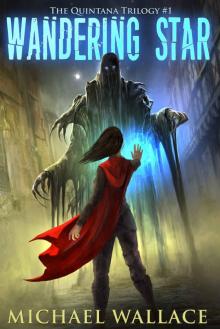 Wandering Star (The Quintana Trilogy Book 1)
Wandering Star (The Quintana Trilogy Book 1) Bladedancer
Bladedancer Sword Saint
Sword Saint The Alliance Trilogy
The Alliance Trilogy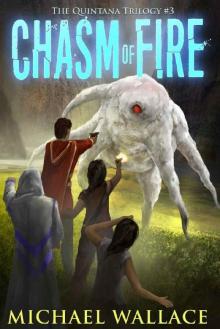 Chasm of Fire
Chasm of Fire Bladedancer (The Sword Saint Series Book 4)
Bladedancer (The Sword Saint Series Book 4) The Devil's Deep
The Devil's Deep Shadow Walker (The Sword Saint Series Book 3)
Shadow Walker (The Sword Saint Series Book 3) Starship Blackbeard
Starship Blackbeard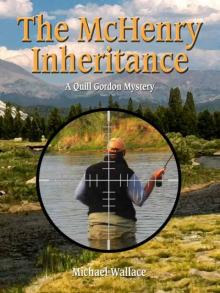 The McHenry Inheritance (Quill Gordon Mystery Book 1)
The McHenry Inheritance (Quill Gordon Mystery Book 1) Sun King (The Void Queen Trilogy Book 3)
Sun King (The Void Queen Trilogy Book 3) Blood of Vipers
Blood of Vipers Righteous - 01 - The Righteous
Righteous - 01 - The Righteous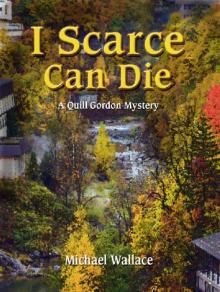 I Scarce Can Die (Quill Gordon Mystery Book 5)
I Scarce Can Die (Quill Gordon Mystery Book 5) The Devil's Cauldron
The Devil's Cauldron The Wicked (The Righteous)
The Wicked (The Righteous) Crow Hollow
Crow Hollow Righteous03 - The Wicked
Righteous03 - The Wicked Righteous02 - Mighty and Strong
Righteous02 - Mighty and Strong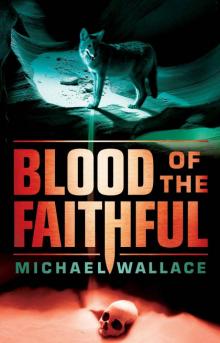 Blood of the Faithful
Blood of the Faithful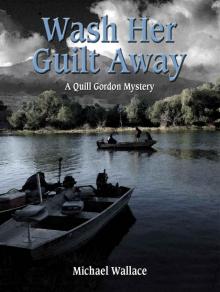 Wash Her Guilt Away (Quill Gordon Mystery Book 2)
Wash Her Guilt Away (Quill Gordon Mystery Book 2) The Kingdom of the Bears
The Kingdom of the Bears The Emerald Crown (The Red Sword Trilogy Book 3)
The Emerald Crown (The Red Sword Trilogy Book 3)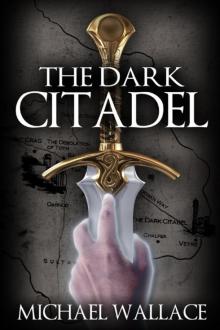 The Dark Citadel
The Dark Citadel The Warrior King (Book 4)
The Warrior King (Book 4) Rebellion of Stars (Starship Blackbeard Book 4)
Rebellion of Stars (Starship Blackbeard Book 4) Righteous04 - The Blessed and the Damned
Righteous04 - The Blessed and the Damned The Crescent Spy
The Crescent Spy Queen of the Void (The Void Queen Trilogy Book 1)
Queen of the Void (The Void Queen Trilogy Book 1)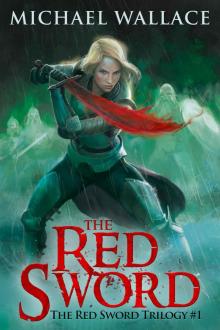 The Red Sword (The Red Sword Trilogy Book 1)
The Red Sword (The Red Sword Trilogy Book 1) The Sentinel (The Sentinel Trilogy Book 1)
The Sentinel (The Sentinel Trilogy Book 1) The Golden Griffin (Book 3)
The Golden Griffin (Book 3) The Blessed and the Damned (Righteous Series #4)
The Blessed and the Damned (Righteous Series #4) Hell's Fortress
Hell's Fortress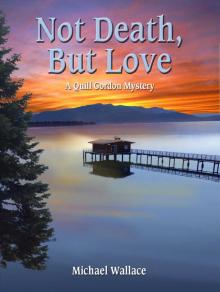 Not Death, But Love (Quill Gordon Mystery Book 3)
Not Death, But Love (Quill Gordon Mystery Book 3) Destroying Angel
Destroying Angel The Free Kingdoms (Book 2)
The Free Kingdoms (Book 2) Dragon Quadrant (The Sentinel Trilogy Book 2)
Dragon Quadrant (The Sentinel Trilogy Book 2) Shattered Sun (The Sentinel Trilogy Book 3)
Shattered Sun (The Sentinel Trilogy Book 3)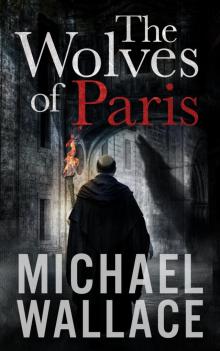 The Wolves of Paris
The Wolves of Paris Lords of Space (Starship Blackbeard Book 2)
Lords of Space (Starship Blackbeard Book 2) Dreadnought (Starship Blackbeard Book 3)
Dreadnought (Starship Blackbeard Book 3) The Village of Dead Souls: A Zombie Novel
The Village of Dead Souls: A Zombie Novel The Black Shield (The Red Sword Book 2)
The Black Shield (The Red Sword Book 2)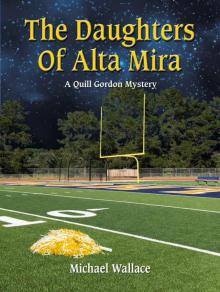 The Daughters Of Alta Mira (Quill Gordon Mystery Book 4)
The Daughters Of Alta Mira (Quill Gordon Mystery Book 4) Mighty and Strong (The Righteous)
Mighty and Strong (The Righteous)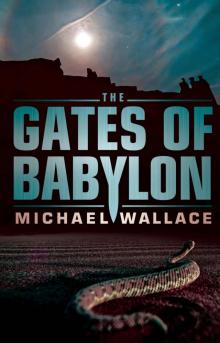 The Gates of Babylon
The Gates of Babylon